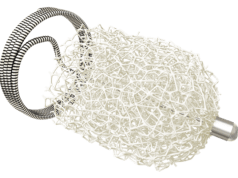
Shape Memory Medical has announced the publication of results from the company’s prospective, open-label, single-arm, safety study of the Impede embolisation plug in peripheral vascular embolisation. The study was published this month in the peer-reviewed journal, Vascular, ahead of print.
Ted Ruppel, chief executive officer of Shape Memory Medical said: “We would like to congratulate the investigators and clinical research team at Auckland City Hospital (Auckland, New Zealand) for completing the study and retrospective review of follow-up imaging. The publication is a significant milestone for the company as we continue to evaluate the potential of shape memory polymer and specifically the Impede embolisation plug family in a variety of arterial and venous applications.”
Both the Impede and Impede-FX embolisation plugs incorporate shape memory polymer (“smart” polymer), a porous, radiolucent, embolic scaffold that is crimped for catheter delivery and self-expands upon contact with blood for acute thrombosis and occlusion. The material is highly conformable and able to accommodate irregular surfaces with low chronic outward force. Shape memory polymer has also been shown in pre-clinical studies to be fully bioresorbable, over time, with collagen formation and fibrosis and without chronic inflammation.
The safety study was registered with the Australian New Zealand Clinical Trials Registry. Procedures were performed from August 2017 through December 2019. Embolised peripheral vascular vessels include inferior mesenteric arteries, testicular veins to treat varicoceles, internal iliac, renal accessory, and left subclavian arteries to treat or prevent endoleaks, and a profunda branch prior to tumour resection and hemiarthroplasty. Acute technical success of target vessel embolisation was achieved in all implantation cases, and no serious adverse events related to the study device occurred. No recurrent clinical symptoms attributable to treated vessel embolisation or recanalisation were documented through 30-day follow-up.
A retrospective review of follow-up imaging through a mean of 22.2 months (range, <1–44 months) was performed post-procedure. “We have been impressed with the performance and durability of the Impede devices which did not show any evidence of recanalization through long-term imaging follow-up,” said principal investigator Andrew Holden (Auckland City Hospital). “The tissue ingrowth into the device is intriguing, and the clinical advantages of this property may emerge in further studies,” stated Holden. “We look forward to seeing how shape memory polymer in clinical practice continues to evolve.”
“Shape memory polymer technology in peripheral vascular embolisation” was first published online in Vascular on 22 May 2023 and is available via open access.












